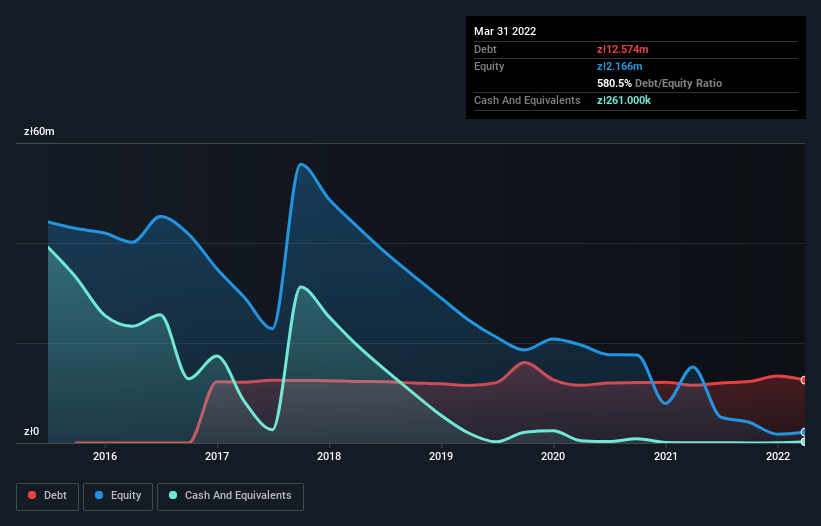
Howard Marks put it nicely when he said that, rather than worrying about share price volatility, 'The possibility of permanent loss is the risk I worry about... and every practical investor I know worries about.' It's only natural to consider a company's balance sheet when you examine how risky it is, since debt is often involved when a business collapses. We can see that Braster S.A. (WSE:BRA) does use debt in its business. But should shareholders be worried about its use of debt?
When Is Debt Dangerous?
Debt and other liabilities become risky for a business when it cannot easily fulfill those obligations, either with free cash flow or by raising capital at an attractive price. If things get really bad, the lenders can take control of the business. However, a more usual (but still expensive) situation is where a company must dilute shareholders at a cheap share price simply to get debt under control. Of course, debt can be an important tool in businesses, particularly capital heavy businesses. When we examine debt levels, we first consider both cash and debt levels, together.
Check out our latest analysis for Braster
How Much Debt Does Braster Carry?
You can click the graphic below for the historical numbers, but it shows that as of March 2022 Braster had zł12.6m of debt, an increase on zł11.6m, over one year. However, because it has a cash reserve of zł261.0k, its net debt is less, at about zł12.3m.

How Healthy Is Braster's Balance Sheet?
We can see from the most recent balance sheet that Braster had liabilities of zł16.9m falling due within a year, and liabilities of zł4.27m due beyond that. On the other hand, it had cash of zł261.0k and zł516.0k worth of receivables due within a year. So its liabilities total zł20.4m more than the combination of its cash and short-term receivables.
Given this deficit is actually higher than the company's market capitalization of zł20.1m, we think shareholders really should watch Braster's debt levels, like a parent watching their child ride a bike for the first time. Hypothetically, extremely heavy dilution would be required if the company were forced to pay down its liabilities by raising capital at the current share price. The balance sheet is clearly the area to focus on when you are analysing debt. But it is Braster's earnings that will influence how the balance sheet holds up in the future. So when considering debt, it's definitely worth looking at the earnings trend. Click here for an interactive snapshot.
Given its lack of meaningful operating revenue, Braster shareholders no doubt hope it can fund itself until it can sell some of its new medical technology.
Caveat Emptor
Over the last twelve months Braster produced an earnings before interest and tax (EBIT) loss. Indeed, it lost a very considerable zł4.3m at the EBIT level. Considering that alongside the liabilities mentioned above make us nervous about the company. We'd want to see some strong near-term improvements before getting too interested in the stock. Not least because it had negative free cash flow of zł1.1m over the last twelve months. That means it's on the risky side of things. The balance sheet is clearly the area to focus on when you are analysing debt. But ultimately, every company can contain risks that exist outside of the balance sheet. These risks can be hard to spot. Every company has them, and we've spotted 4 warning signs for Braster (of which 3 don't sit too well with us!) you should know about.
If, after all that, you're more interested in a fast growing company with a rock-solid balance sheet, then check out our list of net cash growth stocks without delay.
Valuation is complex, but we're here to simplify it.
Discover if Braster might be undervalued or overvalued with our detailed analysis, featuring fair value estimates, potential risks, dividends, insider trades, and its financial condition.
Access Free AnalysisHave feedback on this article? Concerned about the content? Get in touch with us directly. Alternatively, email editorial-team (at) simplywallst.com.
This article by Simply Wall St is general in nature. We provide commentary based on historical data and analyst forecasts only using an unbiased methodology and our articles are not intended to be financial advice. It does not constitute a recommendation to buy or sell any stock, and does not take account of your objectives, or your financial situation. We aim to bring you long-term focused analysis driven by fundamental data. Note that our analysis may not factor in the latest price-sensitive company announcements or qualitative material. Simply Wall St has no position in any stocks mentioned.
About WSE:BRA
Braster
Braster S.A. provides in-home breast cancer examination device worldwide.
Slightly overvalued with imperfect balance sheet.

